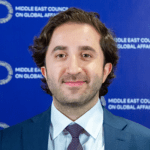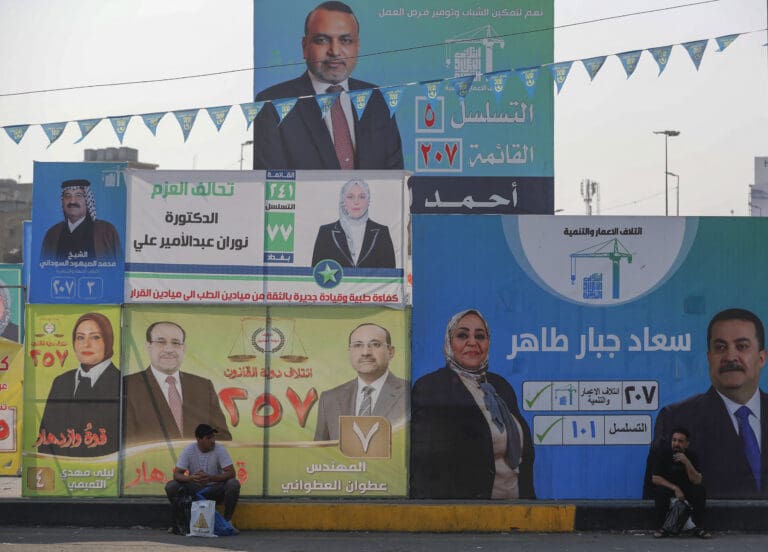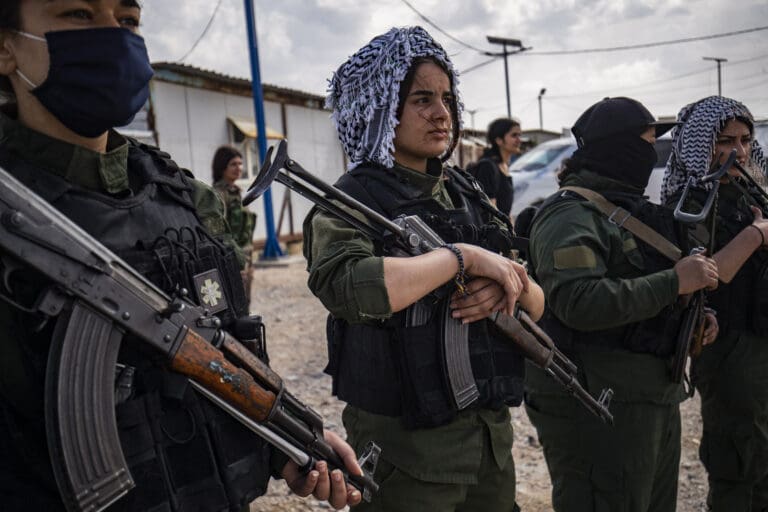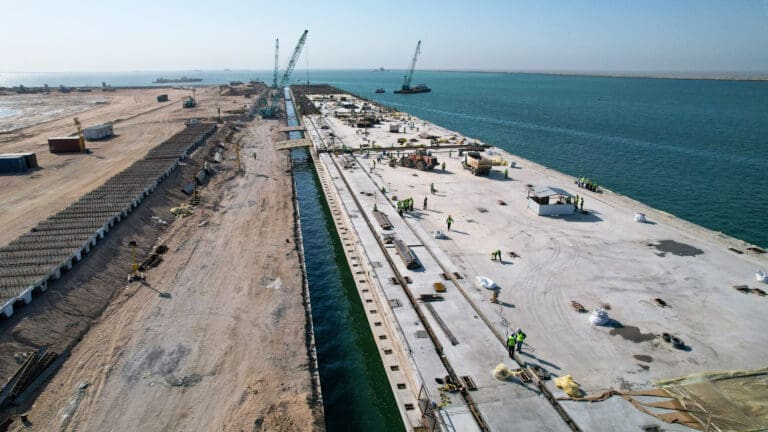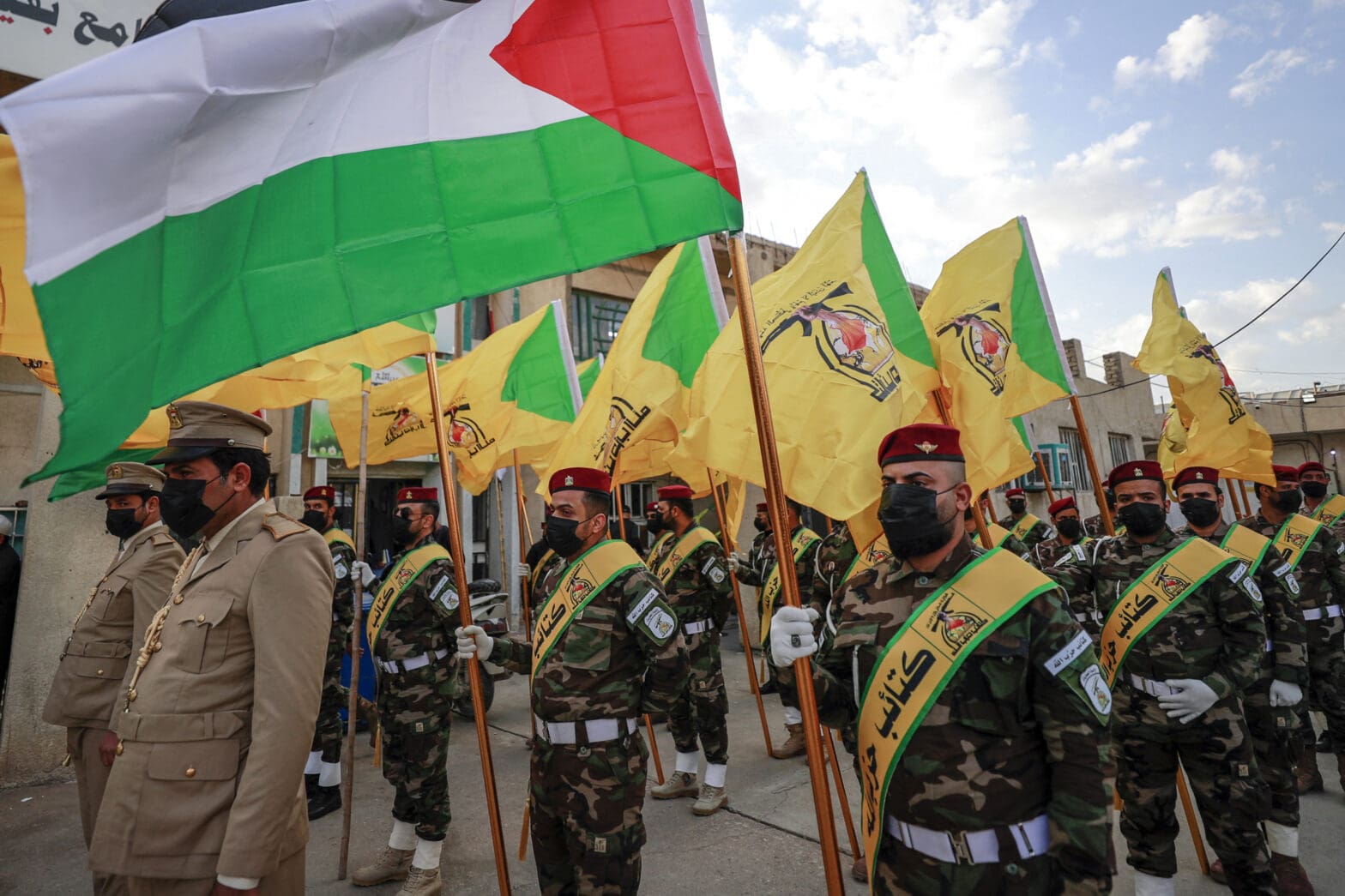
The Iraqi Prime Minister's
Tricky Balancing Act
Policy Note, January 2025
Iraq constitutes a key arena in the region-wide conflict that has emerged from the war in Gaza, and Iran-backed militias in the country constitute a vital component of the “Axis of Resistance.”1 These Iraqi groups have launched several attacks on Israeli and U.S. assets since the post-October 7, 2023 escalation, including assaults on U.S. bases in Iraq and Syria,2 operations against Israeli and Western ships in the Red Sea, and strikes inside Israel.3 The U.S. and Israel have responded with an escalating campaign of airstrikes against these actors.4 As of May 2024, the Islamic Resistance in Iraq—an amalgamation of Iranian-backed Iraqi militia groups who are also part of the Popular Mobilization Forces (PMF)5—had launched more strikes on Israel than Yemen’s Houthi movement since October 7, 2023.6
The dramatic escalation between Israel and Iran, which has resulted in an exchange of unprecedented, direct attacks between the two countries7 and left casualties on both sides, has further heightened tensions within Iraq. That escalation has spurred increased coordination between armed groups that form part of Iran’s “Axis of Resistance,” including between the Islamic Resistance of Iraq and the Houthis,8 who have reportedly established a presence in Iraq.9 Moreover, Iraqi Shiite militant group Kata’ib Hezbollah has threatened countries such as Saudi Arabia, accusing them of enabling “the battle against the Palestinians,” which could have implications for Iraq’s efforts to improve its ties to Riyadh.10
The reverberations of the war underway across the region will be felt acutely in Iraq, particularly if Israel and Iran continue their tit-for-tat strikes.11 Iraqi Prime Minister Mohammed Shia al-Sudani must therefore perform a delicate balancing act. Although Baghdad has close ties to Tehran, it is also partnering with the U.S. in the campaign to secure the enduring defeat of the Islamic State group (ISIS) and enjoys growing ties to U.S.-aligned Gulf countries. As the prospect of a devastating war on Iraqi territory grows, al-Sudani has his work cut out if he is to prevent the country from becoming a major battleground, while also maintaining its strategic ties to the U.S. and wider West.
Al-Sudani’s Calculations
The Middle East faces the risk of a wider, full-fledged conflict between Israel and Iran and its allies after a number of inflections points this year. These have included, among others, the assassination of Hamas’ political chief Ismail Haniyeh in Tehran,12 Iran’s retaliatory attack on Israeli territory,13 the assassination of Hezbollah leader Hasan Nasrallah in Beirut,14 and the subsequent military exchanges between Iran and Israel. These events have unfolded against the backdrop of ever more frequent exchanges between the U.S. and Iran-aligned armed groups in Iraq,15 and between Israel and these actors.16
This poses multiple risks and challenges for Iraq. Domestically, al-Sudani is enjoying a period of sustained stability, with public trust in the state and its institutions growing over the past year, according to polling.17 The prime minister has managed to placate the PMF and has improved Baghdad’s relations with the Kurdistan Regional Government (KRG),18 while balancing Iraq’s ties to both Washington and Tehran. Moreover, Baghdad has improved its relations with the Gulf states and Türkiye, paving the way for enhanced cooperation in trade and commerce, including the signing of an MoU last year aimed at moving forward with the Development Road Project—an ambitious scheme to build a trade route linking the Gulf to Turkish ports via Iraq.19 This has seen the Gulf states expand their economic footprint in the country.
However, this period of calm, political stability, and economic partnership could all be upended if Iraq faces a major conflict, which is likely if things continue along the current trajectory. The country has already played host to an ongoing tit-for-tat conflict between the U.S. and the Islamic Resistance in Iraq, which has escalated since October 7, 2023, and has resulted in casualties on both sides, putting them on high alert. 20
Al-Sudani’s much-anticipated trip to the United States in April was overshadowed by a direct Iranian strike on Israel—days before the premier’s trip—in response to Israel’s missile attack on Tehran’s consulate in Damascus at the beginning of the month.21 Rather than focusing on Iraq’s economic ties to Washington and attracting American investors to Baghdad, al-Sudani was forced to spend the trip discussing defense and counter-terrorism.22 Officially, Iraq’s position is that it no longer needs U.S. troops in the country since ISIS is defeated.23 However, the United States Central Command (CENTCOM) warns that ISIS is on track to carry out more than double its attacks in Syria and Iraq this year compared to 2023, including 153 claimed attacks in the first half of the year alone, indicating that ISIS is attempting to rebuild after years of diminished capabilities.24
The ISIS threat is particularly important in al-Sudani’s balancing act, because it shapes the contours of his ties to both the United States and Iran. It has prompted the premier to re-frame the presence of U.S. forces in the country in an attempt to placate the PMF, which played a key role helping him into office. To manage the PMF’s growing calls for a U.S. withdrawal, alongside Baghdad’s continued need for American support, al-Sudani has echoed the organization’s position, while establishing a non-binding and sparsely detailed agreement that would theoretically see the U.S. withdraw from the country next year.25 Al-Sudani is also helped by the fact that, outside of the PMF, some factions of the Iraqi political class are wary of a complete withdrawal of troops.26
Indeed, such a withdrawal could work against Iraq’s national interests. Aside from opening up the space for the resurgence of ISIS, it could leave U.S. President-elect Donald Trump’s incoming administration with little incentive to opt for de-escalatory measures in the event of further attacks on U.S. personnel or allies in the region. Conversely, al-Sudani relies on the fact that Iraq is arguably Iran’s last remaining bastion of influence, where Tehran can circumvent Western sanctions and maintain a vanguard of armed groups able to play a “forward defense” role in deterring a full-scale attack on the Islamic Republic.27 Accordingly, Iran needs continuity and stability in Iraq, and al-Sudani may, from the Iranian perspective, represent the best means of maintaining the current equilibrium between Tehran and Washington.
However, Iraq’s premier can only do so much; it is entirely possible that the Trump administration will widen its sanctions regime in Iraq by targeting both officials and Iraqi financial institutions, some of which have helped Iran circumvent U.S. sanctions28 and funnel dollars to the Islamic Republic.29 The intensification of these sanctions could upend the equilibrium and weaken al-Sudani’s hand.
The prime minister’s balancing act is also complicated by the fragility of the Iraqi state and its inability to rein in the groups that comprise the Islamic Resistance in Iraq. These non-state actors also have influence over the Iraqi parliament and other institutions through their ties to, and inclusion within, the PMF.30 As a formal and constitutionally recognized part of the Iraqi state and government, the PMF’s indirect or direct complicity in the attacks on the U.S. and its allies will invite retaliatory attacks within Iraq and against Iraq. This would exacerbate al-Sudani’s woes, and his position may be further undermined by growing ties between the Islamic Resistance and other members of the Resistance, including the Houthis and Hezbollah.31
How to Manage the Crisis
The most contentious issues facing Iraq, such as the future of U.S. troops there, are tied to the regional escalation currently underway and have a direct bearing on the country’s ability to avoid a conflict on its own territory. This includes the state’s ability to rein in armed groups that are directly engaged in conflict with the U.S. and Israel; al-Sudani’s ability to placate some of these groups ahead of elections next year; and the wider impact of the post-October 7 escalation on Iraq’s political situation.32 Crucially, the regional escalation could lead powerful rival groups such as the Sadrists and Asaib Ahl al-Haq to escalate their own feuds in order to reassert their influence. This has already played out in assassination attempts over the past year.33 Hence, the effectiveness of al-Sudani’s balancing strategy will also depend on his ability to manage these domestic tensions.
Yet Iraq’s domestic troubles are also likely to be increasingly intertwined with the regional escalation. For example, Israeli Channel 14’s inclusion of Iraq’s top Shiite cleric, Grand Ayatollah Ali al-Sistani, on an Israeli hit list has sparked public outcry.34 Moreover, Iraq is in a state of high alert following the collapse of the Syrian regime, the emergence of Hayat Tahrir al-Sham (HTS) as the rulers of Syria and the possibility of ISIS exploiting the uncertainty and tumult to re-assert itself in Iraq.35 The withdrawal of Iran and its allies from Syria, including Iraqi militia groups, could become a major dividing line for voters as Iraq approaches elections and Iran-aligned groups come under scrutiny for deploying in Syria.
Iraq has played an important role in enabling backchannel communication between Iran and its adversaries.36 Al-Sudani can build on this in order to mediate between the U.S. and Iran. That said, the role of mediator must be recalibrated in light of the current conflict in the region, which will continue to shape ties between the U.S. and Iran for the foreseeable future. Moreover, this mediation will be undermined if the Islamic Resistance of Iraq continues, despite al-Sudani’s efforts, to target U.S. military assets and personnel. These efforts must therefore be two-pronged; al-Sudani will need to engage and manage these groups in parallel with the mediation process.
The Iraqi premier may seek to integrate the Islamic Resistance in Iraq into the mediation process. In the event it resists this, he can still rely on the wider Iraqi political and religious establishment—including his allies in the PMF—to engage these groups indirectly. That at least gives al-Sudani a viable channel through which to begin a dialogue and a sustained approach to the problem, focusing on calming tensions and articulating red lines to bolster de-escalation efforts.
Of course, Iraq has a long-running problem with armed groups that operate outside of the state, but it has so far not included these groups in the mediation process. Such a move may not address the deep-rooted issues that allow these groups to function, but it could contain the problem and represents a better alternative to excluding these groups.
In addition, al-Sudani should give the Gulf states and Türkiye some level of involvement in the mediation process or, at the very least, keep them briefed on it. In doing so, the prime minister could also draw on Baghdad’s improved ties with these states to calm and improve relations with the incoming Trump administration. This could also bring Iraq’s economic partners such as the United Arab Emirates (UAE), Qatar, and Türkiye into the equation as important stakeholders able to help calm regional tensions, push for de-escalation, and insulate Iraq from the regional conflagration without being involved as active belligerents within Iraqi territory.
Endnote
1 “Iraqi groups threaten to target bases if US joins fray against Iran,” The Arab Weekly, October 2, 2024, https://thearabweekly.com/iraqi-groups-threaten-target-bases-if-us-joins-fray-against-iran.
2 Justin Salhani, “Who are the Islamic Resistance in Iraq?,” Al Jazeera English, February 10, 2024, https://www.aljazeera.com/news/2024/2/10/analysis-who-is-the-islamic-resistance-in-iraq.
3 “Yemen’s Houthis claim joint raid on Israeli ships with Iraqi militia”, Al Jazeera English, June 23, 2024, https://www.aljazeera.com/news/2024/6/23/yemens-houthis-claim-joint-raid-on-israeli-ships-with-iraqi-militia.
4 Natasha Bertrand, Haley Britzky, Oren Liebermann, and Kevin Liptak, “US carries out retaliatory strikes on Iranian-linked militia targets in Iraq and Syria,” CNN, February 3, 2024, https://edition.cnn.com/2024/02/02/politics/us-strikes-iraq-syria/index.html.
5 Salhani, “Who are the Islamic Resistance in Iraq?”
6 Michael Knights, The Anti-Israel Surge by Iraqi Militants: Metrics and Trends, Policy Analysis (Washington, DC: The Washington Institute for Near East Policy, May 15, 2024), https://www.washingtoninstitute.org/policy-analysis/anti-israel-surge-iraqi-militants-metrics-and-trends.
7 Tom Bennett, “What we know about Israel’s attack on Iran,” BBC News, October 28, 2024, https://www.bbc.com/news/articles/cgr0yvrx4qpo.
8 Adnan al-Jabarni, A New Axis: Strategic Coordination between the Houthis and Iraqi Factions, Analysis, (Sanaa, Yemen: Sanaa Center for Strategic Studies, July 15, 2024), https://sanaacenter.org/the-yemen-review/april-june-2024/22900.
9 “Inside story: How Yemen’s Houthis dig for strategic depth in Iraq”, Amwaj Media, June 21, 2024, https://amwaj.media/article/inside-story-how-yemen-s-houthis-dig-for-strategic-depth-in-iraq.
10 Foundation for the Defense of Democracies, “Iraq-based Iranian Proxy, Kataib Hezbollah, Threatens Saudi Arabia and Israel,” Flash Brief, (Washington, DC: Foundation for the Defense of Democracies, July 14, 2024), https://www.fdd.org/analysis/2024/07/14/iraq-based-iranian-proxy-kataib-hezbollah-threatens-saudi-arabia-and-israel/.
11 “Israel, Iran urged to use restraint by world leaders, amid concerns of a regional war,” CBS News, October 26, 2024, https://www.cbsnews.com/news/israel-strikes-iran-reaction-world-leaders/.
12 “Hamas political chief Ismail Haniyeh assassinated in Iran,” Al Jazeera English, July 31, 2024, https://www.aljazeera.com/news/2024/7/31/hamass-political-chief-ismail-haniyeh-assassinated-in-iran-state-media.
13 Bennett, “What we know.”
14 Bassem Mroue and Melanie Lidman, “Hezbollah confirms its leader Hassan Nasrallah was killed in an Israeli airstrike,” AP News, September 29, 2024, https://apnews.com/article/lebanon-israel-hezbollah-airstrikes-28-september-2024-c4751957433ff944c4eb06027885a973.
15 Ahmed Rasheed and Phil Stewart, “US strike kills militia leader blamed for Iraq attacks, Pentagon says,” Reuters, January 5, 2024, https://www.reuters.com/world/middle-east/three-iran-backed-militia-fighters-killed-baghdad-drone-strike-sources-2024-01-04/.
16 Associated Press, “Iran-allied militia coalition claims its base in Iraq was hit by an airstrike,” PBS News, April 19, 2024, https://www.pbs.org/newshour/world/iran-allied-militia-coalition-claims-its-base-in-iraq-was-hit-by-an-airstrike.
17 Benedict Vigers and Mohamed Younis, “Iraq: Signs of Stability in a Volatile Region,” Gallup, February 16, 2024, https://news.gallup.com/poll/610355/iraq-signs-stability-volatile-region.aspx.
18 “Barzani meets PM Sudani in Baghdad,” Rudaw, July 3, 2024, https://www.rudaw.net/english/middleeast/iraq/030720242.
19 Neil Halligan and Sinan Mahmoud, “What is Iraq’s Development Road and will it challenge US and China trade routes?,” The National, April 26, 2024, https://www.thenationalnews.com/business/2024/04/24/can-iraqs-development-road-challenge-us-and-china-trade-routes/.
20 >Sinan Mahmoud, “Iran-linked Iraqi militias say truce with US is over,” The National, August 20, 2024, https://www.thenationalnews.com/news/mena/2024/08/20/iran-linked-iraqi-militias-say-truce-with-us-is-over/.
21 Mersiha Gadzo, “Timeline: The key moments that led to Israel’s attacks on Iran,” Al Jazeera, October 26, 2024, https://www.aljazeera.com/news/2024/10/2/timeline-the-key-moments-that-led-to-irans-missile-attacks-on-israel.
22 Yesar Al-Maleki, Iraq’s prime minister will toe a fine line in Washington visit, Analysis, (Washington, DC: Middle East Institute, April 14, 2024), https://www.mei.edu/publications/iraqs-prime-minister-will-toe-fine-line-washington-visit.
23 Timour Azhari, “Exclusive: Iraq seeks quick exit of US forces but no deadline set, PM says,” Reuters, January 10, 2024, https://www.reuters.com/world/middle-east/iraq-seeks-quick-exit-us-forces-no-deadline-set-pm-says-2024-01-10/.
24 Qassim Abdul-Zahra and Abby Sewell, “Islamic State attacks on track to double in Iraq and Syria compared to last year, US military says,” AP News, July 17, 2024, https://apnews.com/article/iraq-syria-islamic-state-us-centcom-attacks-53bdb45048b8f1389d9181b359e8260d.
25 Timour Azhari and Ahmed Rasheed, “US-Iraq deal would see hundreds of troops withdraw in first year, sources say,” Reuters, September 6, 2024, https://www.reuters.com/world/us-iraq-deal-would-see-hundreds-troops-withdraw-first-year-sources-say-2024-09-06/.
26 Arwa Ibrahim, “Iraqi parliament calls for expulsion of foreign troops,” Al Jazeera English, January 5, 2020, https://www.aljazeera.com/news/2020/1/5/iraqi-parliament-calls-for-expulsion-of-foreign-troops.
27 David S. Cloud, “Iraqi Banks Used U.S.-Created System to Funnel Funds to Iran,” The Wall Street Journal, September 8, 2024, https://www.wsj.com/politics/national-security/iraq-banks-u-s-fed-iran-financing-0c3e740c.
28 Ibid.
29 Reuters, “Iraq Bans 8 Local Banks From US Dollar Transactions,” Voice of America, February 4, 2024, https://www.voanews.com/a/iraq-bans-8-local-banks-from-us-dollar-transactions/7470566.html.
30 Ranj Alaaldin, The Popular Mobilization Force is turning Iraq into an Iranian client state, (Washington, DC: Brookings Institute, February 2, 2024), https://www.brookings.edu/articles/the-popular-mobilization-force-is-turning-iraq-into-an-iranian-client-state/.
31 Ali Hashem, “Inside story: Hezbollah rep returns to Iraq ahead of expected escalation,” Amwaj Media, January 6, 2024, https://amwaj.media/article/exclusive-hezbollah-rep-returns-to-iraq-ahead-of-expected-escalation.
32 “New twist in ‘heist of the century’ in Iraq as key figure ‘fakes accident’ in Beirut,” Amwaj Media, August 28, 2024, https://amwaj.media/media-monitor/new-twist-in-heist-of-the-century-in-iraq-as-key-figure-fakes-accident-in-beirut.
33 Fadhel al-Nashmi, “Prominent Member of Asaib Ahl al-Haq Survives Assassination Attempt in Southern Iraq,” Asharq Al-Awsat, September 16, 2024, https://english.aawsat.com/arab-world/5061418-prominent-member-asaib-ahl-al-haq-survives-assassination-attempt-southern-iraq.
34 Dana Taib Menmy, “Iraqi officials condemn Israeli media for inciting killing of top Shia cleric Grand Ayatollah Al-Sistani,” The New Arab, October 10, 2024, https://www.newarab.com/news/iraqi-fury-israeli-media-incites-killing-top-shia-cleric.
35 “Iraq accelerates bolstering border security with Syria amid growing conflict”, Rudaw English, 5 December 2024, https://www.rudaw.net/english/middleeast/iraq/05122024/; see also “Regime change in Syria raises fears for Kurds and the ISIS prisoners they guard”, NBC News, 11 December 2024, https://www.nbcnews.com/news/world/regime-change-syria-raises-fears-kurds-isis-prisoners-guard-rcna183727.
36 Elizabeth Hagedorn and Andrew Parasiliti, “Iran sent US back-channel messages on risk of wider regional war, FM says,” Al-Monitor, January 24, 2024, https://www.al-monitor.com/originals/2024/01/iran-sent-us-back-channel-messages-risk-wider-regional-war-fm-says.

